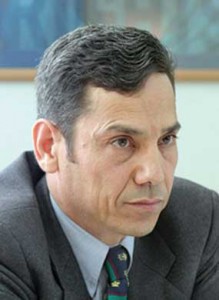Imprisoned Lawyer Denied Urgently Needed Medical Treatment
Denial is Punishment for Soltani’s Refusal to Recant His Beliefs, Says Daughter

Despite the severely deteriorating health of imprisoned Iranian lawyer Abdolfattah Soltani, the Tehran Prosecutor refuses to grant him permission to receive medical care outside the prison, due to the prominent lawyer’s steadfastness about his beliefs, Soltani’s daughter told the International Campaign for Human Rights in Iran. Maedeh Soltani told the Campaign that her father suffers from heart disease and fluctuations in blood pressure, and that requests for his transfer to a hospital have been denied for the past month.
“The prison doctor has written that my father needs to be treated outside the prison, and for more than a month my mother has repeatedly requested my father’s transfer to a hospital, but her requests have been denied. We are seriously worried that my father’s situation will intensify and [that] he will suffer a heart attack,” Maedeh Soltani told the Campaign.
“Mr. Khodabakhshi, the supervising Assistant Prosecutor at Evin Prison, who is responsible for requests submitted by prisoners, once told my mother, ‘We don’t grant your husband furlough, because he insists on his points of view.’ Mr. Khodabakhshi has said that the Prosecutor’s Office is against his transfer,” Maedeh Soltani told the Campaign.
A leading human rights lawyer, Soltani was arrested on September 10, 2011. On January 8, 2012, Branch 26 of Tehran Revolutionary Court presided by Judge Pirabbasi sentenced him to 18 years in prison, to be served in exile at Borazjan Prison, and a 20-year ban on practicing law. He was prosecuted on charges of “being awarded the [2009] Nuremberg International Human Rights Award,” “interviewing with media about his clients’ cases,” and “co-founding the Defenders of Human Rights Center.” Soltani spent months in solitary confinement in the Intelligence Ministry’s Ward 209 at Evin Prison, where he developed severe anemia. In June 2012, an appeals court reduced his prison sentence to 13 years.
During the years Soltani has spent in prison, he has been transferred to the prison infirmary on numerous occasions for his heart and blood pressure conditions, and in 2013 he spent 41 days in a hospital, but was returned to prison before his full recuperation.
On December 10, 2014, Abdolfattah Soltani and four other political prisoners inside Evin Prison’s Ward 350, Saeed Madani, Mehdi Khodaee, Keyvan Samimi, and Saeed Razavi Faghih, issued a statement on the occasion of Human Rights Day. The five human rights and political activists listed ongoing violations of human rights in Iran, including violations of due process; an increase in the number of unfair and heavy sentences issued, such as the death penalty; and the Judiciary’s refusal to implement certain parts of the Islamic Penal Code that would lead to the release of a number of prisoners (such as Article 134 of the Code).






